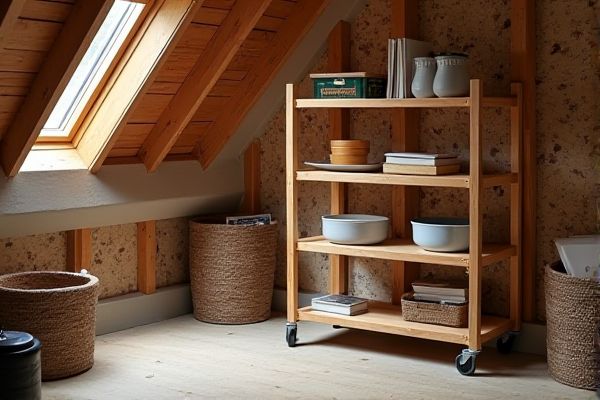
An attic wheeled cart offers mobility and easy access to stored items, making it ideal for frequently used belongings, while a stationary shelf provides a stable, space-efficient solution for long-term storage in confined areas. Discover how to choose the best storage option for your attic by reading the rest of this article.
Table of Comparison
| Feature | Attic Wheeled Cart | Stationary Shelf |
|---|---|---|
| Mobility | High - easily moved for access or cleaning | None - fixed in one position |
| Space Efficiency | Compact, fits narrow attic spaces | Requires dedicated floor or wall space |
| Weight Capacity | Moderate - depends on wheel strength and frame | High - sturdy for heavy attic storage |
| Installation | No installation needed, ready to use | Requires secure mounting or assembly |
| Accessibility | Improved - can reposition to reach items | Limited to fixed location |
| Cost | Usually higher due to mobility features | Generally lower, simpler design |
| Durability | Depends on materials, may wear wheels over time | Often more durable and long-lasting |
Introduction to Attic Storage Solutions
Attic wheeled carts offer flexible, mobile storage options that maximize space efficiency and ease of access in constrained areas. Stationary shelves provide durable, fixed storage ideal for organizing heavier or bulky items without the need for repositioning. Choosing between these attic storage solutions depends on the balance between mobility needs and long-term stability for optimal organization.
Overview of Wheeled Carts and Stationary Shelves
Wheeled carts in attics provide flexible storage solutions that allow you to easily move items for better access and cleaning, enhancing organization in tight spaces. Stationary shelves offer sturdy, fixed storage optimized for heavier or frequently used items, maximizing vertical space without risk of tipping. Choosing between these depends on your attic's layout and whether mobility or permanent organization best suits your storage needs.
Space Utilization: Wheeled Cart vs Stationary Shelf
A wheeled attic cart offers flexible space utilization by allowing you to easily move and access stored items, maximizing the use of limited attic space. Stationary shelves provide stable, fixed storage that optimizes vertical space but can limit accessibility to items at the back or bottom. Choosing a wheeled cart enhances efficiency in tight areas, while stationary shelves are ideal for organizing heavier or bulkier items without relocation.
Accessibility and Convenience Comparison
An attic wheeled cart offers superior accessibility by allowing you to easily move items closer and navigate tight spaces, enhancing convenience during storage or retrieval. In contrast, a stationary shelf provides a fixed, stable storage solution but requires more effort to reach items, especially in cramped attic environments. Choosing between the two depends on your need for mobility versus the stability of a permanent storage setup.
Load Capacity and Durability
Attic wheeled carts typically offer load capacities ranging from 150 to 300 pounds, designed for easy mobility and temporary storage, making them less durable under constant heavy loads compared to stationary shelves. Stationary shelves, often constructed from steel or heavy-duty wood, support significantly higher weights--up to 1,000 pounds or more per shelf--ensuring long-term durability and structural stability. The choice depends on whether mobility or maximum load capacity and durability are the primary needs for attic organization.
Installation and Setup Differences
An attic wheeled cart offers a portable storage solution requiring minimal installation, often needing only space clearance for easy maneuverability. In contrast, a stationary shelf demands a more permanent setup involving wall mounting or floor anchoring, which may require tools, hardware, and structural assessment. The wheeled cart's setup is typically faster and more flexible, while the stationary shelf provides stable, fixed storage optimized for long-term organization.
Flexibility and Mobility in Attic Storage
An attic wheeled cart provides superior flexibility and mobility compared to stationary shelves, enabling you to easily move items around for convenient access and rearrangement in tight spaces. Wheeled carts adapt to changing storage needs by allowing quick relocation without heavy lifting, while stationary shelves offer fixed organization but limited mobility. Choosing a wheeled cart enhances your attic's functional storage capacity by combining portability with efficient use of available space.
Safety Considerations for Attic Storage Units
When comparing attic wheeled carts to stationary shelves, safety considerations primarily revolve around stability and ease of access. Wheeled carts may pose a risk of tipping or rolling unexpectedly, requiring secure locking mechanisms and careful weight distribution, whereas stationary shelves offer enhanced stability but limit mobility. Proper installation, weight limits, and load balancing are critical for both options to prevent accidents and ensure safe storage in attic spaces.
Cost Analysis: Wheeled Cart vs Stationary Shelf
A wheeled attic cart typically costs between $50 to $150, offering mobility for flexible storage solutions, while stationary shelves range from $100 to $300 based on materials and size, providing more robust and permanent storage capacity. Wheeled carts may incur additional maintenance costs due to wheel replacements and durability concerns, whereas stationary shelves demand minimal upkeep but often require professional installation. Cost-effectiveness depends on storage needs, with wheeled carts favored for temporary or dynamic spaces and stationary shelves preferred for long-term, high-capacity organization.
Choosing the Best Storage Solution for Your Attic
Choosing between an attic wheeled cart and a stationary shelf depends on your storage needs and space flexibility. Wheeled carts offer mobility, making it easier to access and reorganize items in confined attic spaces, while stationary shelves provide stable, permanent storage ideal for heavy or bulky possessions. Consider the weight capacity, ease of installation, and the frequency of accessing stored items to determine the best storage solution for your attic.
 homyna.com
homyna.com